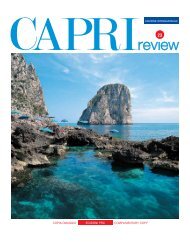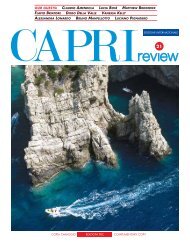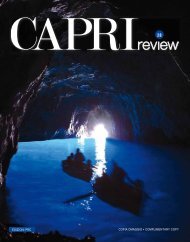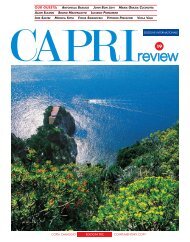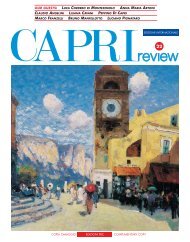Create successful ePaper yourself
Turn your PDF publications into a flip-book with our unique Google optimized e-Paper software.
86<br />
[Profili]<br />
Un premio di nome Gorkij<br />
È Aldo Nove il vincitore della Prima edizione del Premio Gorkij che con la raccolta di racconti<br />
Superwoobinda si è aggiudicato il primo posto della sezione “Autori”. Il premio per la<br />
sezione “Traduttori” è andato invece a Margherita Crepax per La scuola degli sciocchi di Sasha<br />
Sokolov. Il concorso letterario riservato ad opere di narrativa e di traduzione letteraria italiane<br />
e russe è nato con l’ambizione di gettare un ponte culturale tra i due paesi ed è articolato in<br />
due sezioni, in una concorrono scrittori russi e italiani contemporanei le cui opere siano state<br />
tradotte nell’altra lingua, la seconda interessa invece i traduttori. La cerimonia di premiazione<br />
di questa prima edizione si è svolta a <strong>Capri</strong>, le successive avranno luogo, ad anni alterni, a<br />
Mosca e a <strong>Capri</strong>.<br />
The Gorky Prize<br />
Aldo Nove is the winner of the First Gorky Prize for his collected short stories<br />
Superwoobinda, awarded first prize in the Authors Section. The prize in the Translators<br />
Section went to Margherita Crepax for her translation of Sasha Sokolov’s La scuola degli<br />
sciocchi. This literature competition for Italian and Russian narrative works and literary<br />
translation was created with the intention of serving as a cultural bridge between the two<br />
countries. The Prize is divided into two sections, the first for contemporary Russian and<br />
Italian writers whose works have been translated into the other language and the second for<br />
translators. This year’s award ceremony was held in <strong>Capri</strong> while, in the future, ceremonies<br />
will alternate between Moscow and <strong>Capri</strong>.<br />
solo alle prime luci dell’alba il futuro rivoluzionario<br />
lasciò <strong>Capri</strong> per lanciarsi nella sua<br />
grande avventura.<br />
Negli ultimi tre anni di permanenza a <strong>Capri</strong><br />
Gorki si trasferì prima a Villa Behring e poi a<br />
Villa Pierina, più grandi e adatte ad ospitare<br />
il numero sempre crescente di rifugiati russi.<br />
Rientrato in Russia nel 1913, a seguito di<br />
un’amnistia, lo scrittore si impegnò in una<br />
incisiva attività politica a sostegno della rivoluzione.<br />
L’attrazione per l’Italia era però<br />
troppo forte e decise di tornarvi. Scelse allora<br />
di trasferirsi in una grande villa di Sorrento,<br />
Il Torrito, dove visse e operò dal 1924 fino al<br />
maggio del 1933. Una permanenza serena e<br />
produttiva, anche se resa fastidiosa dai continui<br />
controlli della polizia fascista, che sorvegliava<br />
la sua corrispondenza e i movimenti di<br />
denaro. Per tutti i nove anni che trascorse a<br />
Sorrento, amici e ammiratori da ogni parte<br />
del mondo continuarono però a scrivergli e<br />
a cercarlo a <strong>Capri</strong>, dove il mito del grande<br />
scrittore si era ormai indelebilmente fuso con<br />
la magia dell’isola. <br />
political refugees, artists, and just plain<br />
down-and-outs, all of whom filled his<br />
house day and night, and all of whom<br />
were treated to his generous hospitality.<br />
Conversations after dinner would go on until<br />
dawn, with literary or political discussions<br />
alternated with singing and dancing to<br />
the accompaniment of Adolfo Schiano,<br />
barber by day, and impromptu guitarist by<br />
night, and a talented one at that. Among<br />
Gorky’s closest friends on the island were<br />
Bodganov, Regacewski, and Lunacharsky,<br />
with whom Gorky founded the “School of<br />
Revolutionary Technique,” financing it with<br />
the proceeds of his copyright royalties and<br />
his work as an editor.<br />
Occasionally, Gorky’s wife and son would<br />
come down from Switzerland to visit him.<br />
This would set off a silent war between the<br />
two women that the writer would blithely<br />
pretend not to notice. At other times his<br />
productive working days would be spoiled<br />
by the police, who had to keep an eye on<br />
the constant flow of visitors to Gorky’s door,<br />
albeit discreetly. To the “lessons,” however,<br />
Gorky preferred excursions to Naples, a city<br />
he loved, or lengthy fishing trips with the<br />
island’s fishermen, with whom he managed<br />
to communicate despite not knowing a<br />
word of Italian. To return Gorky’s friendship,<br />
for him and his companion the fishermen<br />
collected the molluscs that hugged the rocks,<br />
which the couple adored, and dubbed them,<br />
in the writer’s honour, “Massimo Gorki’s<br />
limpets.”<br />
The writer’s extended stay on <strong>Capri</strong><br />
coincided with an extraordinary season of<br />
literary activity. Enthused, Gorky had this<br />
to say in a letter to his friend Leonid N.<br />
Andreev: “The Gulf of Naples – and <strong>Capri</strong><br />
above all – is more achingly beautiful and<br />
more profound than love itself or women<br />
could ever be. With love, you work it all out<br />
right at the beginning. Here, I’m not sure it<br />
is even possible to discover all there is to<br />
know.”<br />
Among Settani’s extremely youthful<br />
recollections are his memorable descriptions<br />
of the writer’s characteristic gait as he “strode,<br />
shoulders hunched, like a vagabond who<br />
devoured infinite distances,” or his “sibilant<br />
yet soft voice, which came out in bursts or<br />
whispers, and which could caress you or cut<br />
like a knife.”<br />
The island calm enabled Gorky to write<br />
without interruption; on <strong>Capri</strong> he created<br />
immortal works such as The Mother; Tales<br />
of Italy, a tribute to Italy and its gentle spirit,<br />
which would always be important to him; and<br />
also powerful dramas such as The Lower<br />
Depths and Summerfolk. Gorky alternated<br />
his periods of writing with short trips to<br />
Tuscany or Liguria, and kept up a continuous<br />
correspondence with fellow Russians<br />
scattered all over the world, as well as Italian<br />
writers the likes of Grazia Deledda and<br />
Edmondo De Amicis.<br />
One chill evening in January, even Vladimir<br />
Ilyich Ulyanov, better known as Lenin,<br />
landed on the island. After a stormy crossing<br />
he was welcomed at Gorky’s residence, but<br />
refused anything more than a cup of tea<br />
and biscuits. On the other hand, he did ask<br />
the writer to read a few pages of the book<br />
he was then working on. As it turned out,<br />
the reading lasted all night, and only at the<br />
break of day did the future revolutionary<br />
leave <strong>Capri</strong> to embark on his epic adventure.<br />
In the last three years Gorky lived on <strong>Capri</strong>,<br />
he moved first to the Villa Behring and then to<br />
the Villa Pierina, which were larger and better<br />
suited to accommodating the growing number<br />
of Russian refugees who sought his aid.<br />
Upon his return to Russia in 1913, following<br />
an amnesty, the writer launched into politics,<br />
supporting the revolution. The attraction<br />
of Italy proved to be too strong to resist,<br />
however, and Gorky decided to return. This<br />
time he chose a spacious villa in Sorrento,<br />
Il Torrito, where he lived and worked from<br />
1924 until May 1933. This was another highly<br />
productive period, relatively serene despite<br />
repeated checks by the fascist police, who<br />
monitored his correspondence as well as any<br />
transfers of funds.<br />
For all the nine years that Gorky spent in<br />
Sorrento, however, friends and admirers<br />
from the world over continued to write to him<br />
and seek him out on <strong>Capri</strong>, where the great<br />
writer’s legend was now indelibly linked to the<br />
island’s magic spell.



